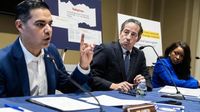In a political standoff that has gripped Texas and drawn national attention, the question of federal law enforcement’s role in a state-level dispute has sparked fierce debate and alarm across the political spectrum. Over the past week, claims and counterclaims have swirled regarding the FBI’s involvement in tracking down more than 50 Texas Democratic lawmakers who fled to Illinois to block a Republican-led redistricting effort. As the dust settles, the controversy reveals not just a fight over legislative maps, but a deeper struggle over the boundaries of political power and the use of federal resources.
The drama began in early August 2025, when Texas House Democrats, seeking to prevent a quorum and stall a contentious redistricting vote, left their home state for Illinois. According to ABC7 Chicago, their departure effectively halted legislative business in Austin, infuriating Texas Republicans and prompting extraordinary measures to compel their return. On August 7, U.S. Senator John Cornyn announced that FBI Director Kash Patel had approved a request to assist Texas law enforcement in locating these lawmakers. “I am proud to announce that Director Kash Patel has approved my request for the FBI to assist state and local law enforcement in locating runaway Texas House Democrats,” Cornyn declared in a statement. He thanked both President Trump and Director Patel for “swiftly acting on my call for the federal government to hold these supposed lawmakers accountable for fleeing Texas.”
The escalation did not stop there. Texas Governor Greg Abbott called for the arrest and return of absent Democrats, while Republican leaders issued civil warrants—though these are only enforceable within Texas. Now, with the FBI purportedly involved, the reach of these efforts seemed to extend well beyond state lines. As reported by ABC7 Chicago, a bomb threat at the St. Charles, Illinois hotel where the Democrats were staying further heightened tensions, though there was no evidence linking the threat to the political dispute.
For the Democrats, the developments were nothing short of alarming. State Rep. John Bucy of Austin, himself a recipient of a civil warrant during a previous quorum break in 2021, called the push to involve the FBI “disgusting.” “To now bring the FBI in to hunt down Democratic elected officials from Texas because we're using a constitutional right we have to break quorum, it's disgusting,” Bucy told ABC7 Chicago. State Rep. Ann Johnson of Houston echoed those concerns, warning, “This threat of trying to haul members in through the power of the federal government, the Trump administration, is not like anything that's ever been suggested or happened before. And so I think that's why people need to be anxious and nervous at this time.”
Yet, the legal grounds for such federal intervention remain murky at best. Gil Soffer, chief legal analyst for ABC7 Chicago, remarked, “It's not at all clear that they have the authority to do something like that when we're talking about a civil warrant, really akin to a contempt violation from a different state.” Senator Cornyn, anticipating these questions, argued that lawmakers who “solicited or accepted funds to aid in their efforts to avoid their legislative duties may be guilty of bribery or other public corruption offenses,” potentially opening a door for federal involvement. Still, as Illinois Governor JB Pritzker put it, “The reality is that all that he has said, Cornyn, is that the FBI has been authorized to locate the Texas House Democrats, nothing more.”
Meanwhile, in Washington, Democratic leaders were quick to launch their own investigation. On August 8, Representatives Jamie Raskin, Robert Garcia, Greg Casar, and Jasmine Crockett demanded answers from Attorney General Pamela Bondi and FBI Director Patel regarding the use of federal law enforcement in what they saw as a purely political dispute. In their letter, the lawmakers wrote, “We write with great concern about the abuse of federal public safety resources for completely political purposes and without a law enforcement rationale that is reportedly taking place right now. We demand information about the Federal Bureau of Investigation’s (FBI) involvement in efforts to locate or apprehend members of the Texas House of Representatives who are not accused of any federal crime but have chosen to break quorum during the current legislative session.”
The letter also referenced Texas’s long history of quorum breaks as a form of protest, stretching back to the 1870 “Rump Senate incident,” the 1979 “Killer Bees” episode, and the 2003 and 2021 redistricting battles. In 2003, the involvement of federal agencies in tracking down absent lawmakers was condemned as unethical and illegal by various authorities. “Senator John Cornyn has claimed that the FBI is assisting the Texas Department of Public Safety (DPS) in identifying or locating Democratic state lawmakers who left the state to counter President Trump’s aggressive moves to consolidate power by redrawing Congressional district lines in Texas to prevent being investigated by a Democratic majority in the House of Representatives,” the letter stated, according to House Oversight Committee records.
Democratic leaders in Congress were even more blunt in their criticism. House Democratic Leader Hakeem Jeffries said, “Shouldn’t the FBI be tracking down terrorists, drug traffickers and child predators? The Trump administration continues to weaponize law enforcement to target political adversaries.” Jeffries insisted, “There would be no authority for the FBI to target Democrats from the Texas Legislature in connection with an act that Democrats have taken that is authorized by the Texas Constitution.” Senate Democratic Leader Chuck Schumer added, “This is authoritarianism. Plain and simple. Texas Democrats are standing up for Democracy, and Republicans want to send in the federal government to round them up? That is not American.”
Other Democrats, including Sen. Sheldon Whitehouse and Rep. Jamie Raskin, warned that the FBI’s involvement would set a “dangerous precedent” and called on agency personnel to “refuse to participate in this act of political harassment and persecution.” Not Above the Law, a coalition of advocacy groups, issued a joint statement: “Federal law enforcement must never be weaponized as a political tool of the president or manipulated by state-level politicians to serve partisan agendas. Using federal agents to encroach on state matters sets a dangerous precedent that threatens the rights and freedoms of every American.”
For its part, the FBI has declined to comment on the specifics of its involvement, leaving many questions unanswered. As The Hill and Nexstar Media reported, neither Senate Majority Leader John Thune nor Speaker Mike Johnson has weighed in publicly, highlighting the political sensitivity of the issue even among Republicans. Some observers, like Illinois Governor Pritzker, have dismissed the controversy as “grandstanding,” but the stakes are undeniably high.
As the Texas Democrats wait in Illinois, the battle over redistricting has become a flashpoint for broader debates about the limits of federal power, the sanctity of protest, and the dangers of politicizing law enforcement. The outcome may set the tone for how such disputes are handled in the future—and whether political protest is protected or prosecuted in the United States.


